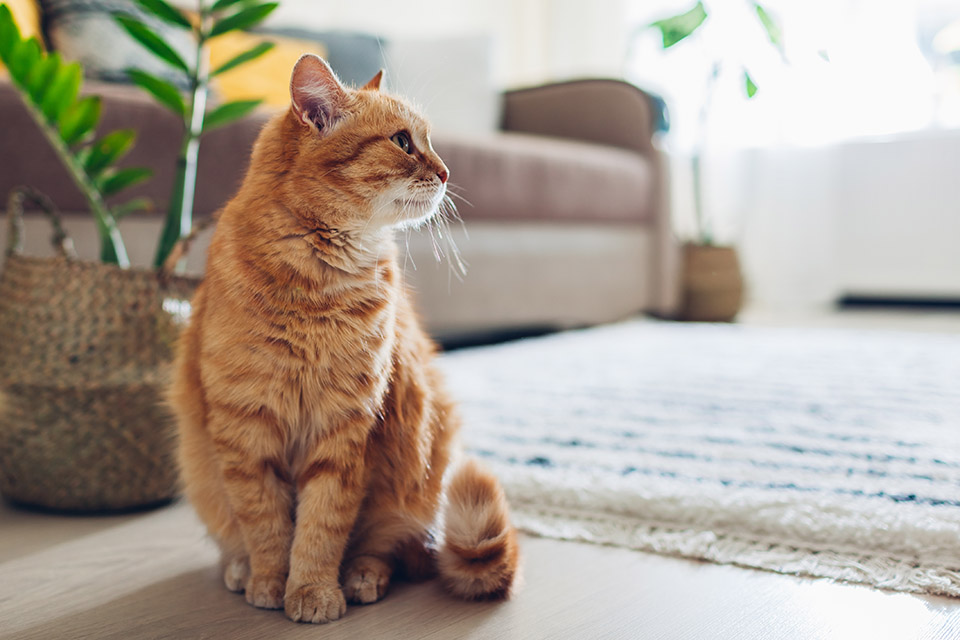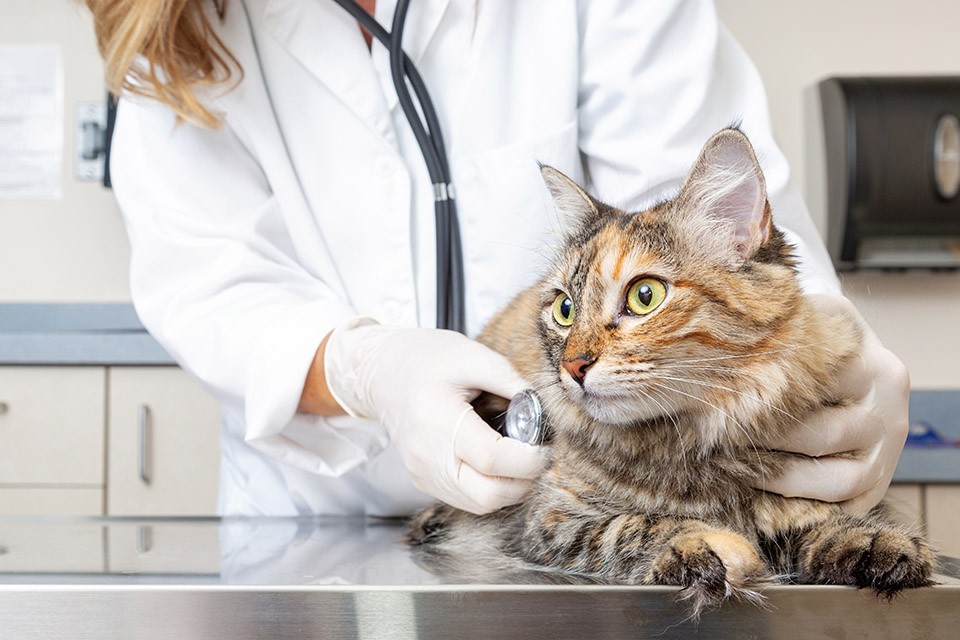
Radioactive Iodine Treatment at the Purdue Veterinary Hospital
Feline hyperthyroidism is a very common disorder in older cats. It is caused by excessive production of thyroid hormone by the thyroid gland. It can lead to behavioral changes, hyperactivity, weight loss, high blood pressure, and heart disease.
Treatment
One of the most effective treatments for feline hyperthyroidism is radioactive iodine (I-131). Once administered, the radioactive iodine concentrates within the thyroid gland and the emitted radiation destroys functional thyroid tissue without causing radiation damage to the normal parts of the thyroid gland or other tissues in the body. The advantage of this treatment is that it is both safe and effective.
Dosage
In our program, the typical dose administered is 3-4 millicurie, with reduced doses considered for cats that have chronic kidney disease or very mild hyperthyroidism.
Side Effects
Side effects of the treatment may include a slight worsening of kidney function and some risk of reduced thyroid function (hypothyroidism). Before treatment we conduct several pre-diagnostic tests to help us determine the best dose needed for your cat. This keeps the risk of secondary complications very low.
Waiting Period
Because radioactive iodine takes time to reduce to safe levels, cats need to be kept with us for a few days after treatment. The typical hospitalization period for evaluation and treatment in our facility is 5-7 days. Cats that share a home with children, pregnant women, or cats treated for malignant thyroid tumors may need to stay a few days longer.
What To Bring
Please bring enough of your cat’s usual food with them to last the duration of their stay (approximately 7 days), so that they can stay on the same diet they eat at home. You can also bring toys, blankets and a bed but these will not be able to be returned to you because of the risk of radioactive contamination.

Information for Owners
- Once we receive a referral from your primary veterinarian, we will reach out to schedule your appointment with our small animal internal medicine team.
- Due to a high case load, we may be scheduling 1-3 months out in advance.
- There will be a list of diagnostics for your primary veterinarian to complete within 2 weeks prior to your appointment with us that includes: Complete Blood Count (CBC), Biochemical Profile (Chemistry), T4, Urinalysis, Indirect Blood Pressure, Thoracic Radiographs, and Rabies Vaccination
- Patient must discontinue Methimazole medication 2 weeks prior to appointment with us
- Patient must be fully off of Hill’s y/d diet 3 weeks prior to appointment with us.

Information for Referring Veterinarians
- Discuss methimazole trial or hill’s y/d trial options prior to offering I-131 treatment.
- Complete and submit a referral form via email or fax.
- After your referral form is submitted, our team will reach out to the owner to schedule an appointment.
- Once the patient has an appointment scheduled, the following diagnostics are REQUIRED to be completed within 2 weeks prior to their scheduled appointment with us: CBC, Biochemical Profile (Chemistry), T4, Urinalysis, Indirect Blood Pressure, Thoracic Radiographs, and Rabies Vaccination
- The following diagnostics are not required, but highly recommended: FeLV/FIV and FVRCP Vaccination
- Patient must discontinue Methimazole medication 2 weeks prior to appointment with us.
- Patient must be fully off of Hill’s y/d diet 3 weeks prior to appointment with us.
- Patient cannot be receiving any medications at the time of treatment that they can not eat willingly in food.
What to Expect at Your Appointment with Purdue University Veterinary Hospital
We understand how important it is for you to feel prepared and informed. Knowing what to expect during your cats's visit can help the experience as smooth and stress-free as possible for both of you.
Initial Evaluation
A Purdue Veterinary Hospital clinician and a veterinary student in small animal internal medicine will ask about your cat’s history, perform a physical examination, and review your cat’s test results. We will also collect a small blood sample to measure the pre-treatment total T4 concentration.
The lab work performed by your veterinarian is not likely to be repeated unless you report new concerns about your cat which have developed before your appointment with Purdue or if it has been over four weeks since the most recent lab work was performed.
If we identify any concerning abnormalities on our physical examination or prior lab work, additional tests we feel are necessary will be discussed with you.
Admission and Treatment
If we determine that your cat is a good candidate for treatment, we will admit them to the hospital and order the correct dose of radioactive iodine for your cat. We will also make sure that they are comfortable and willing to eat in the hospital.
The following day we will administer the radioactive iodine treatment by injection under the skin (subcutaneous).
Waiting Period
The radioactive iodine used in this treatment takes a few days for the radioactivity to reduce to safe levels.
During this waiting period your cat will have a private cage with a bed, litter box, and as much food and water as they want. Our staff will check on your cat at least twice a day.
Most cats only require a waiting period of 3-5 days. However, some cats may need to stay with us longer depending on circumstances.
When your cat’s radioactivity reading has dropped to a safe level, we will collect another small blood sample to measure the post-treatment T4 concentration. This allows us to make sure your cat has responded well to treatment.
Release and At-Home Care
Prior to taking your cat home, you will be asked to sign a release form which explains how to take care of your cat at home. We will provide instructions on how long your cat needs to be kept inside, how long you need to keep your cat at a safe distance after release, and how to dispose of the cat litter properly.
It is safe for cats to return to a home with other pets after treatment and even for them to share the same water bowls and litter boxes.
Future Testing
After release from the hospital, we recommend that the total T4, kidney function, and blood pressure are rechecked by your primary veterinarian at 1, 3, 6 and 12 months after treatment.
Frequently Asked Questions
Here are some answers to questions we are frequently asked.
How do I schedule my cat for this treatment?
After being diagnosed with hyperthyroidism, your primary veterinarian should recommend trying a methimazole trial or food trial first, if applicable.
If you have discussed options and your veterinarian recommends radioactive iodine treatment, they will need to complete a referral form for the Purdue University Veterinary Hospital (SAIM) and submit documentation.
Once we receive your referral, someone from our team will call you to discuss treatment and schedule your pet’s appointment with us.
Why do I have to stop my cat’s methimazole or hill’s y/d diet before treatment?
In order to accurately treat your pet for their disease, they must be off of any medication or diet that is actively affecting their thyroid levels. Radioactive iodine is a dose-dependent injection, so it is very important for us to know what your pet’s thyroid levels are without management to administer the correct dose.
Why do I have to have lab work done prior to treatment?
These tests give us information that enables us to select the best dose of radioactive iodine for your cat. In our program, the typical dose administered is 3-4 millicurie, with reduced doses considered in cats that have chronic kidney disease or very mild hyperthyroidism.
How much does it cost to have my cat treated with radioactive iodine?
The cost of this procedures varies depending on different factors including case. Please contact the Purdue University Small Animal Hospital to inquire about pricing.
Does the injection hurt my pet?
The injection is given directly under the skin (subcutaneously) and only takes a few seconds. Most cats that are able to be handled do very well with being restrained for the short injection period. The injection shouldn’t hurt them other than a small sting for a short moment.
How long does my cat have to stay in hospital?
Most cats only need to stay with us for the minimum 72 hours after injection. After the 72-hour period, your cat is scanned to assess their radioactivity levels. Once the radioactive readings are at a safe level they will be released.
Pets that share a home with children, pregnant women, or immunocompromised individuals require an extended stay prior to being released. The extended period for pets receiving treatment is a minimum of 5 days after injection. After the 5-day period, your cat is scanned to assess their radioactivity levels. Once the radioactive readings are at a safe level they will be released.
Why does my cat have to stay so long?
Radioactive iodine takes a few days for the radioactivity to reduce to safe levels. Because the radioactive iodine releases through the patient’s urination and defecation, the time it takes depends on how often the pet is eating, drinking, and using the litter box in hospital.
Do I have to isolate my pet once they come home?
No, your pet does not need to be isolated in a separate area once they return home. We recommend minimizing extended periods of contact with them, such as sleeping in the same bed.
Can I bring items with my pet while they stay at the hospital?
Yes, but unfortunately, any items brought back into isolation during the waiting period will not be returned to you because of the risk of radioactive contamination.
You are more than welcome to bring special items to the hospital while your pet stays with us. This can make them feel more at home and more comfortable in a new setting. Many clients will bring things such as blankets, beds, t-shirts, treats, and toys.
Your cat carrier will remain outside of the isolation room, so your cat can return to you in the same carrier in which they were brought.


